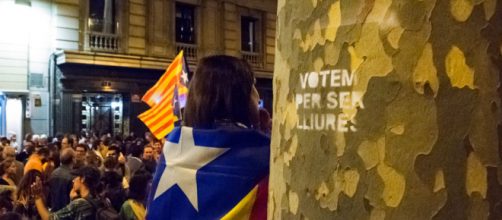As I straddled a wall overlooking the large crowd at Fira Barcelona - Montjuïc, a huge screen projected a speech by the president of Catalonia Carles Puigdemont. The audience’s emotions rose to jubilation for the expected announcement of independence and then sunk to quiet disappointment as it became apparent that there would be no announcement this day.
What Led to the Current Situation?
What followed was a period of tension that in the end accomplished nothing for Catalan independence. During his initial speech, Puigdemont put the ball in the hands of the Spanish courts and halted the Declaration Of Independence for 2 weeks of negotiations with Spain.
Spain’s current right-wing government led by prime minister Mariano Rajoy refused to budge in any negotiations and took the approach of no compromise. So as can be expected, two weeks later Catalonia finally declared independence and sent the region into a period of great uncertainty that still exists today.
The immediate reaction from Spain was to double down on their heavy-handed style of ruling and the Senate gave prime minister Rajoy the power to strip Catalonia of its autonomy and declare Direct Rule on the region as set out in Article-155 of the 1978 Constitution.
What followed was the arrests of 8 Catalan ministers as they attended a court hearing in Madrid. Arrests warrants have been issued for other Catalan activists and government officials, including President Puigdemont who has fled to Belgium to seek asylum.
The State of Limbo
Currently, the region sits in an unknown state where half of the population has declared themselves independent, while the other half are still holding on to Spanish rule and unity.
In its limbo state, Catalonia does not exist as black and white. The beliefs and emotions of the population are so mixed and diverse that many individual families have split down the middle.
Summary of Viewpoints
A general summary of the popular viewpoints includes:
- Those who just want more autonomy: They generally want more autonomy to control their economics and self-rule Catalonia. They would like to remain in Spain.
- Those who want Spanish unity: This is the general group of Spanish who would not like to see Spain break apart and believe that law and order should be held that upholds the Constitution.
- The Independentismos: They would like full independence. They do not feel Spanish for their difference in language, culture and beliefs. Some do not feel that the economic situation of Spain is helping Catalonia. Many in this group grew up during Fascism and hold historical resentment for Spain.
- Ultra-right: This group is made up of a small minority, but tend to make the most noise at the pro-Spain rallies. They want the return of fascism and believe that right-wing ideals and Spanish Nationalism support their cause.
- Anti-nationalist: This includes those that do not want the return of national conflict that caused World War 2. Many have pride in the unity of the European Union and want less importance placed on national borders.
What Lies Ahead?
In addition to direct rule, Spain has declared snap elections in Catalonia for December.
Many in Catalonia believe that sentiment towards Catalan Independence has become even more positive in response to the actions by Spain that include police abuse at the polling stations, direct rule, and arrests of the political activist. This raises the question that if snap elections are held in December, will Catalonia just vote again for a pro-independence party?
On the other side, the region has been hit hard economically as over 1000 companies have left the region due to uncertainty and tourism has dropped close to 30%. This may cause the more economic-minded Catalans to reject any sort of change from the current economic situation that sets Catalonia as one of the wealthier regions of Spain.
Overall, it seems that there is still an air of uncertainty as to what will happen in Catalonia. The forward momentum of the Independence movement has seemed to have been snuffed out, but resentment towards Spain has seemed to grow. The snap elections in December could throw the region into further unpredictability depending on the outcome. Spain is also coming under pressure from the international community to vote on changes to their constitution and become a federal state which could finally see a Catalan Independence vote declared legal.


